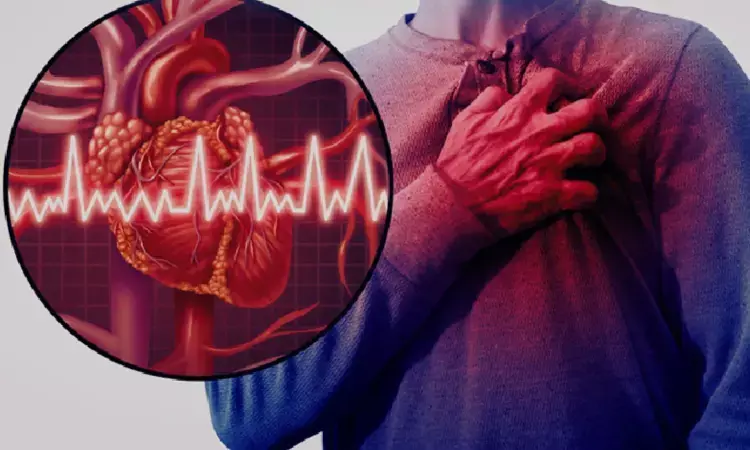- Home
- Medical news & Guidelines
- Anesthesiology
- Cardiology and CTVS
- Critical Care
- Dentistry
- Dermatology
- Diabetes and Endocrinology
- ENT
- Gastroenterology
- Medicine
- Nephrology
- Neurology
- Obstretics-Gynaecology
- Oncology
- Ophthalmology
- Orthopaedics
- Pediatrics-Neonatology
- Psychiatry
- Pulmonology
- Radiology
- Surgery
- Urology
- Laboratory Medicine
- Diet
- Nursing
- Paramedical
- Physiotherapy
- Health news
- Fact Check
- Bone Health Fact Check
- Brain Health Fact Check
- Cancer Related Fact Check
- Child Care Fact Check
- Dental and oral health fact check
- Diabetes and metabolic health fact check
- Diet and Nutrition Fact Check
- Eye and ENT Care Fact Check
- Fitness fact check
- Gut health fact check
- Heart health fact check
- Kidney health fact check
- Medical education fact check
- Men's health fact check
- Respiratory fact check
- Skin and hair care fact check
- Vaccine and Immunization fact check
- Women's health fact check
- AYUSH
- State News
- Andaman and Nicobar Islands
- Andhra Pradesh
- Arunachal Pradesh
- Assam
- Bihar
- Chandigarh
- Chattisgarh
- Dadra and Nagar Haveli
- Daman and Diu
- Delhi
- Goa
- Gujarat
- Haryana
- Himachal Pradesh
- Jammu & Kashmir
- Jharkhand
- Karnataka
- Kerala
- Ladakh
- Lakshadweep
- Madhya Pradesh
- Maharashtra
- Manipur
- Meghalaya
- Mizoram
- Nagaland
- Odisha
- Puducherry
- Punjab
- Rajasthan
- Sikkim
- Tamil Nadu
- Telangana
- Tripura
- Uttar Pradesh
- Uttrakhand
- West Bengal
- Medical Education
- Industry
Dynamic change in troponin values fails to identify MI in patients with acute ischemic stroke: JAMA

Germany: In a groundbreaking study published in JAMA Neurology, researchers have shed light on the often-overlooked connection between Type 1 Myocardial Infarction (MI) and Acute Ischemic Stroke (AIS). This research unveils the intricate relationship between these two critical cardiovascular events, highlighting the need for comprehensive assessment and management strategies in patients presenting with AIS.
The cross-sectional study found that a dynamic change in troponin values does not help detect myocardial infarction in acute ischemic stroke, emphasizing that dynamic changes do not reveal the underlying pathophysiological mechanism of myocardial injury.
"The study found that a dynamic change in troponin was not associated with MI in patients with ischemic stroke, however, baseline absolute troponin value independently associated with type 1 myocardial infarction," the researchers reported. "The best cutoffs for predicting type 1 MI were 5 to 10 times the upper limit of normal."
Type 1 MI, characterized by plaque rupture and subsequent thrombosis leading to coronary artery occlusion, has long been recognized as a significant contributor to cardiovascular morbidity and mortality. On the other hand, AIS, caused by the sudden interruption of blood flow to the brain, poses severe neurological consequences, including paralysis and cognitive impairment. While these conditions have traditionally been distinct entities, recent evidence suggests a notable overlap, especially concerning patients with AIS.
Increased values of high-sensitivity cardiac troponin (hs-cTn) are common in patients with AIS and are associated with poor prognosis. However, there is no clarity on therapeutic and diagnostic implications in patients with ischemic stroke. Christian H. Nolte, Charité-Universitätsmedizin Berlin, Berlin, Germany, and colleagues aimed to identify factors indicative of MI in patients with acute ischemic stroke and hs-cTn elevation. The primary hypothesis was that a dynamic change of hs-cTn values (>50% change) in patients with AIS indicates MI.
For this purpose, the researchers conducted a prospective, observational study with a blinded end-point assessment conducted across 26 sites in Germany. Patients who had an acute ischemic stroke within 72 hours and either (1) highly increased hs-cTn values on admission (>52 ng/L) or (2) hs-cTn levels above the upper limit of normal and a greater than 20% chance at repeated measurements, were included.
Patients' enrollment was between 2018 and 2020, and had one year of follow-up. Exposure included standardized electrocardiography, coronary angiography, and echocardiography.
The main measures were MI diagnosis adjudicated by an independent end-point committee based on echocardiography, electrocardiography, and coronary angiography findings.
The following were the key findings of the study:
- In total, 254 patients were included. Endpoints adjudicated in 247 patients (median age, 75 years; 53% females).
- MI was present in 51% of patients and classified as type 1 MI in 20% of patients.
- Dynamic change in hs-cTn value was not associated with MI in univariable (32% versus 38%) or adjusted comparison (odds ratio, 1.05).
- The baseline absolute hs-cTn value was independently associated with type 1 MI.
- The best cutoffs for predicting type 1 MI were at hs-cTn values 5 to 10 times the upper limit normal.
The study found that a dynamic change in hs-cTn values did not identify MI in AIS patients, underscoring that dynamic changes do not determine the underlying pathophysiological mechanism.
"In exploratory analyses, very high absolute hs-cTn values were associated with a diagnosis of type 1 MI. There is a need for further studies on how to identify best patients with stroke who should undergo coronary angiography," the researchers wrote.
Reference:
Nolte CH, von Rennenberg R, Litmeier S, et al. Type 1 Myocardial Infarction in Patients With Acute Ischemic Stroke. JAMA Neurol. Published online June 03, 2024.
doi:10.1001/jamaneurol.2024.1552
Dr Kamal Kant Kohli-MBBS, DTCD- a chest specialist with more than 30 years of practice and a flair for writing clinical articles, Dr Kamal Kant Kohli joined Medical Dialogues as a Chief Editor of Medical News. Besides writing articles, as an editor, he proofreads and verifies all the medical content published on Medical Dialogues including those coming from journals, studies,medical conferences,guidelines etc. Email: drkohli@medicaldialogues.in. Contact no. 011-43720751


